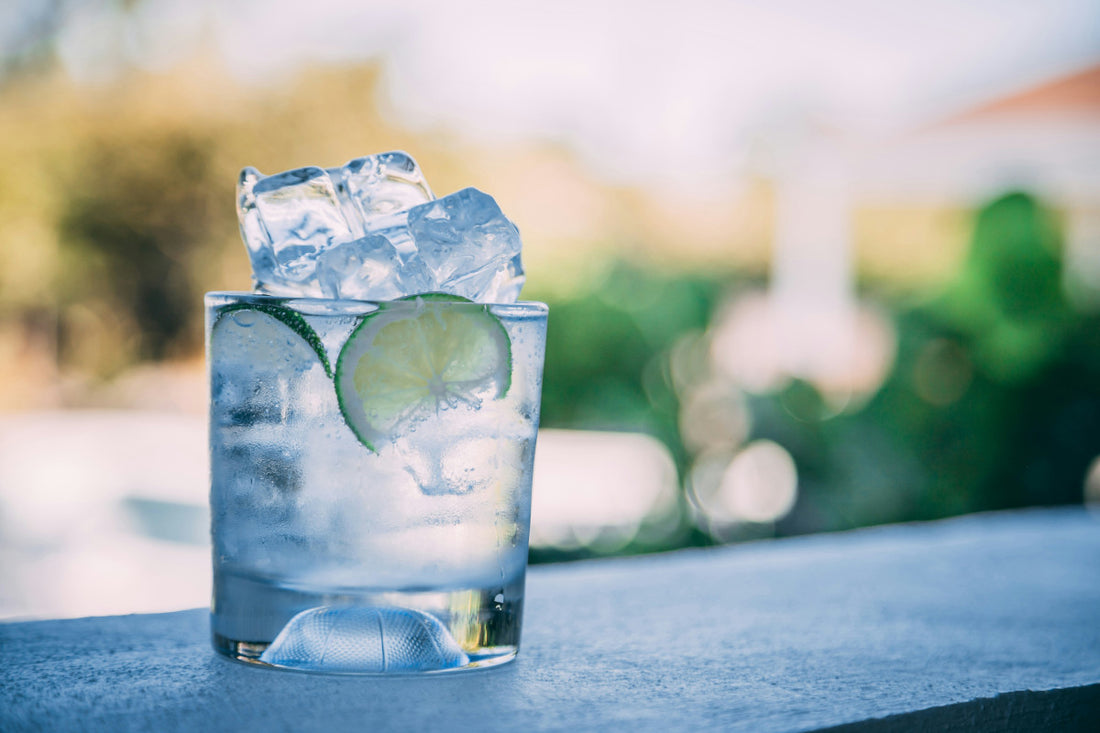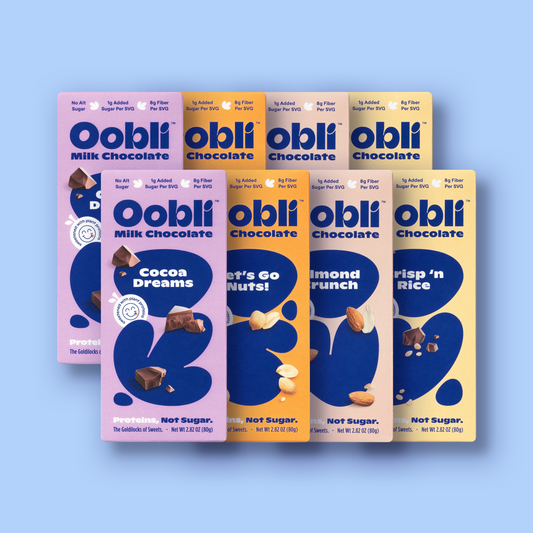Whether you use it as a mixer for alcohol or you’re crazy enough to drink it straight, you may be discovered to discover just how much sugar is in tonic water - as much as 32 grams in a single 12 ounce can or bottle!
This is particularly concerning when using it to make cocktails since you might end up indulging in a few servings over the course of a night. The tonic water sugar content can quickly add up, and when paired with alcohol, makes for some really nasty hangovers.
But the actual sugar in tonic water itself is cause for concern, especially given the rise in diabetes, obesity, and other sugar-related diseases.
Is zero-sugar tonic water the answer, or is there a better alternative you can consider? Learn more below as we take a deep dive into the sugar content in tonic water.
What Exactly is Tonic Water?
Tonic water is a carbonated soft drink distinguished by a bitter edge, courtesy of quinine. It was used historically as a medicinal tonic where quinine, extracted from the bark of the cinchona tree, was dissolved in water as a prophylactic against malaria.
Its roots trace back to the 19th century when British officials stationed in tropical colonies mixed this bitter medicine with sugar and water to make it palatable, inadvertently creating the tonic water we know and enjoy today.
A lot has changed since then, though. Tonic water has evolved from a health remedy to a popular mixer in cocktails, most famously paired with gin in the classic Gin and Tonic.
Modern tonic water might still contain quinine, but at much lower concentrations than the original versions. The quinine provides a characteristic bitter flavor, but today's varieties also include sweeteners to balance the bitterness, making them more enjoyable to drink on their own or as a component of mixed beverages.
The presence of sugar and other flavorings, alongside carbonation, makes tonic water a refreshing choice with a complex taste profile that stands out from other fizzy drinks. Therein lies the problem, though - sugar.
Does Tonic Water Have Sugar?
Wait, does tonic water have sugar? Traditionally, yes. There are zero sugar tonic water alternatives floating around, but the real deal does include sugar as a sweetener to mask the bitterness associated with quinine.
How Much Sugar is in Tonic Water?
So how much sugar is in tonic water, exactly? There’s no one size fits all answer as it greatly depends on the brand and the size of your serving. On average, though, the tonic water sugar content can be as much as 32 grams of sugar per 12-ounce serving.
That’s roughly equivalent to 8 teaspoons of sugar in just one can or bottle, but how does it compare to the soda sugar content? The Coke sugar content and Mountain Dew sugar content come in at 39g and 46g respectively.
So, despite being referred to as a type of “water”, it’s clear that tonic water has more to it than meets the eye. Is the sugar content in tonic water really that big of a deal, though?
Why the Tonic Water Sugar Content is Cause for Concern
If you’re simply enjoying a gin and tonic every so often, you probably don’t need to stress about the sugar in tonic water. However, if you consume tonic water regularly, you’ll be surprised at just how quickly the issues associated with its sugar content can creep up on you. These include:
- Weight Gain: Liquid calories, particularly from sugar, do not satisfy hunger as effectively as calories from solid foods, which can lead to overconsumption and subsequent weight gain.
- Increased Risk of Type 2 Diabetes: Frequent spikes in blood sugar and insulin levels may increase the risk of developing type 2 diabetes.
- Heart Disease: High sugar intake is associated with an increased risk of heart disease. Studies have shown that consuming one or two servings of sugary drinks a day is linked to a 35% greater risk of heart attack or fatal heart disease and a 16% increased risk of stroke.
- Dental Health: Sugar is a leading cause of cavities as it feeds the bacteria in your mouth, which in turn produce acids that can erode tooth enamel.
For individuals who enjoy tonic water regularly, especially in cocktails, it's important to be aware of how much sugar you're consuming in a single sitting. Just compare how much sugar is in tonic water to the beer sugar content, which is just a few grams per can.
In contrast, a single serving of tonic water can almost bring you up to your daily limit, which is around 40-50g for healthy adults. That being said, is the answer as simple as replacing it with low-sugar or sugar-free tonic water?
Is Low-Sugar or Sugar-Free Tonic Water Any Better For You?
Choosing low-sugar or sugar-free tonic water might seem like a healthier choice for those looking to enjoy the distinctive taste of tonic without the usual sugar content.
These alternatives typically use artificial sweeteners to replicate the sweetness of their sugared counterparts, offering a lower-calorie drink without sacrificing flavor.
Sure, you’re getting less sugar - and fewer calories as a result. They can also be a saving grace for those with diabetes or insulin sensitivity as they minimize sudden spikes in blood sugar levels.
However, it’s important to consider the potential downsides of artificial sweeteners used in sugar-free tonic waters, which are well documented and just as concerning themselves.
Some studies suggest that long-term consumption of artificial sweeteners may have negative effects on gut health and metabolism. While these sweeteners are FDA-approved and considered safe for general consumption, the debate over their health implications continues.
The truth is, these just don’t taste as good either. Tonic water is already bitter, and low-sugar tonic water or sugar-free tonic water is dramatically more bitter. The aftertaste can be tough to stomach, too.
Introducing Healthier Options for When Cravings Strike
When you’re craving something fizzy and flavorful but want to sidestep the sugar trap, there are plenty of healthier alternatives that can quench your thirst without the guilt. Some of these are just a few clicks away at Oobli, too!
One great choice is sparkling herbal water. These are infused with natural flavors like mint, ginger, or cucumber, offering a refreshing twist without any added sugars or artificial ingredients. They provide the carbonation you love, with a subtle flavor that’s perfect for sipping any time.
Just be aware that the natural sugar content in these can rival that of soft drinks in some cases. Instead, consider creating your own infused water by adding slices of fruits, vegetables, and herbs to still or sparkling water.
This not only enhances the water's taste but also adds a touch of natural sweetness to the fruits. Try combinations like strawberry and basil or lemon and rosemary for a delicious, hydrating drink.
Those who like their beverages with a bit more character can try kombucha - a type of fermented tea that’s naturally effervescent and comes in a variety of flavors. We discussed the kombucha sugar content itself as well, and when you make your own, it can be a low-sugar alternative.
But if you’re looking for the tastiest, healthiest drinks without sugar or artificial sweetener, look no further than our low-sugar lemonade or low-sugar iced tea here at Oobli.
We’re leading the charge on a sweet revolution where you can have your cake and eat it too - ok, not really cake, but you can enjoy a delicious drink without any of the guilt. With just a few grams of sugar and no compromise on taste, Oobli is taking the world by storm.
How do we do it? Sweet proteins. These are derived from fruit and 5,000 times sweeter than sugar, meaning we can use a lot less to get the same great taste. They don’t affect your blood sugar and are packed with antioxidants and other benefits, too.
So, try our sweet protein-packed drinks today, or spoil yourself with our low-sugar chocolate to satisfy your taste buds without compromising on your health goals. Who said you can’t enjoy the best of both worlds?
Closing Thoughts on the Amount of Sugar in Tonic Water
That concludes our guide to how much sugar is in tonic water. As you can see, the amount of sugar in tonic water is surprisingly similar to that of many sodas at a whopping 32g per 12-ounce serving.
The high sugar content in tonic water can pose health risks such as increased calorie intake, potential weight gain, and higher risk of diabetes.
For those concerned about sugar, low-sugar or sugar-free alternatives offer a viable solution, although it's important to consider the potential effects of artificial sweeteners. Instead, you may consider our solutions here at Oobli.
You’re up to speed on the sugar content in tonic water, but why not learn about the hidden sugar lurking in other popular drinks and snacks? We’re here to spread awareness about just how sugar-packed the most popular choices are:
- Sweet tea sugar content
- Bubble tea sugar content
- Vitamin Water sugar content
- Chai tea latte sugar content
- Ginger ale sugar content
- Coconut water sugar content
- Gatorade Zero sugar content
- Kool-Aid sugar content
- Coffee creamer sugar content
- Chocolate sugar content
- Orange juice sugar content
Fortunately, you can avoid all the trouble associated with excess tonic water sugar content or any other drink for that matter right here at Oobli. Ditch the sugar, keep the taste!




